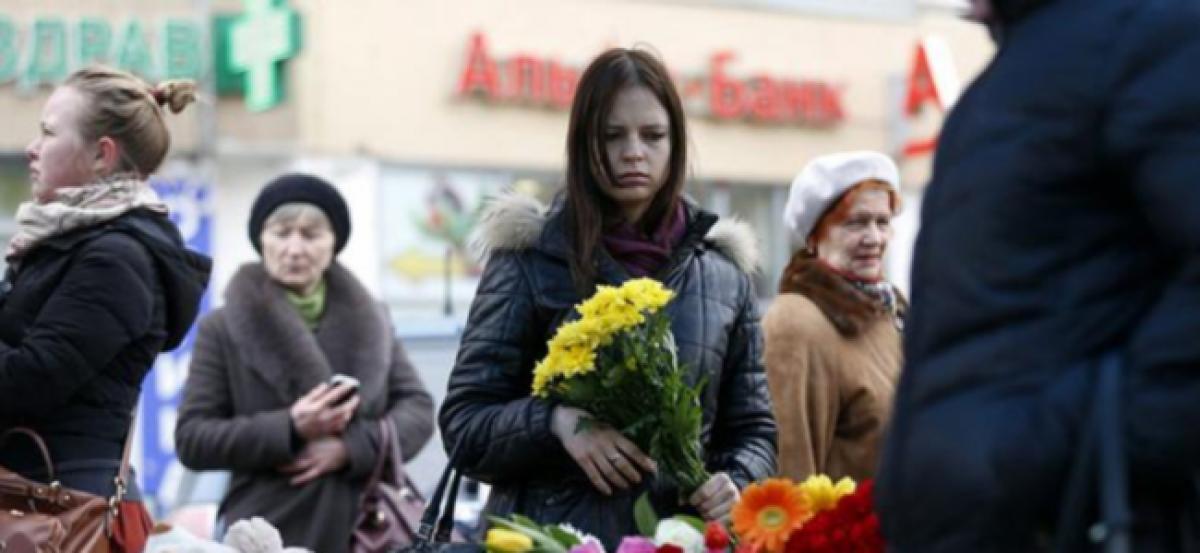Live
- ‘One nation, one election’ will undermine India’s federal structure: Mehbooba Mufti
- ‘Bachhala Malli’ trailer heightens anticipation
- Karnataka quota row: Backward Class forum chief warns Lingayat seer over 'tinkering with reservations'
- Tight security arrangements at Group-II examination centers District SP
- Alia Bhatt captures attention in white
- Varun Dhawan talks about ‘Baby John’
- ‘Moonwalk’ trailer promises a quirky heist, love, and loyalty
- Combat leaf spot disease
- Ahsaas Channaopens up about her complex character in ‘Mismatched 3’
- Radhika Apte welcomes first child, shares heartfelt post
Just In

The Kremlin has defended the decision by several Russian news networks not to report on the arrest of a nanny Monday (29 February) who was pictured holding the head of a child she had decapitated and threatening to blow herself up outside a Moscow metro station.
The Kremlin has defended the decision by several Russian news networks not to report on the arrest of a nanny Monday (29 February) who was pictured holding the head of a child she had decapitated and threatening to blow herself up outside a Moscow metro station.
The horrifying news story has made headlines around the world, with the 38-year-old woman from Uzbekistan reportedly confessing to killing the four-year-old in her care then carrying the head onto the street in the north-west of the capital. Witnesses said she shouted Allahu Akbar, or 'God is great' in Arabic before being arrested.
However none of Russia's main state-funded media networks, including Channel One, Russia-1, NTV and Moscow's TVTs, made a single mention of the incident. Instead, most focussed their coverage on clashes between police and refugees in Macedonia, and the Oscar awards ceremony in LA, reported business news outlet RBK.
While the story spread rapidly on social media and was reported on various Kremlin-funded foreign language networks, there was silence on the television outlets, which comprise the main source of news for most Russians. In a statement on Tuesday, 1 March, presidential spokesman Dmitry Peskov said the Kremlin supported the networks' decision, saying that the incident was "too horrible to show on TV".
Russia's 20 million Muslims make up about 15 per cent of the population. Many travel from Muslim-majority Central Asian Republics to Moscow, where they find employment in a variety of low-wage jobs including construction.
Ethnic animosity has simmered for years in the Russian capital, with rioting locals attacking immigrants in 2013 after an Azerbaijani male killed a 25-year-old Russian man, in what he claimed was an act of self-defence.
Russian authorities feared an "explosion of xenophobia" due to ethnic prejudices, they could have hardly stamped out. As a matter of fact, in the wake of this dreadful murder the police warned ultra-nationalists organizations to cut off any anti-immigrant related demonstration.
The nanny, named as Gyulchekhra Bobokulova, reportedly said she was haunted by 'voices' on the day of the murder and was driven mad after her husband left her to start another family while she was working in Moscow.
The head of Moscow's Muslim council, Ildar Alyautdinov, stressed that the attack had nothing to do with Islam. "This is an issue of an absolutely unhinged person, so it would be completely erroneous to associate some actions with Muslims and Islam, on the basis of clothing or some slogans," he told RIA Novosti.

© 2024 Hyderabad Media House Limited/The Hans India. All rights reserved. Powered by hocalwire.com







